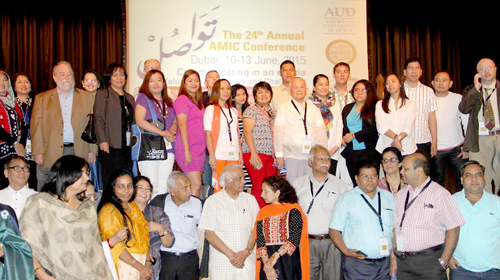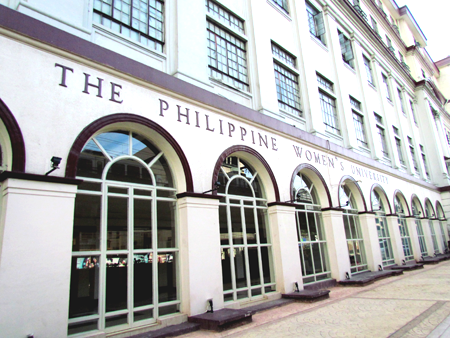Oct 5, 2015 | Annual Conference, Events
Rethinking Communication in a Resurgent Asia
According to an ancient Chinese proverb, To forget one’s ancestors is to be a brook without a source, a tree without root.
An old Philippine proverb says, Sino man ang hindi marunong lumingon sa kanyang pinang-galingan, ay hindi makakarating sa kanyang paroroonan. (He who does not think back on his past, will not arrive at his destination.)
We invoke this ancient Asian wisdom to warn, as we lunge headlong into today’s fast-changing world, that non-Asian communication theories, sophisticated gadgets and apps are not the panacea to the world’s problems. The solutions are in us.
We in AMIC and in Asia need to rediscover our roots, somehow buried under our feet as we run mindlessly forward. We have imbibed non-Asian ways, and adopted foreign communication theories, methodologies and practices as we studied abroad, and brought them back to Asia to teach to our young students who would one day become our disciples.
We preach that communication and culture are inextricably linked. But have we studied or developed Asian theories of communication based on Asian culture? Very little. In this coming 2016 AMIC annual conference we suggest that we pause and look back to where we came from.
We need to rediscover our “Asianess” amidst a resurging Asia. The Asian Development Bank has reported that if Asia continues its current growth trajectory, by 2050 it will regain the dominant economic position it held some 300 years ago, before the industrial revolution. In this scenario Asia’s gross domestic product (GDP) will reach $174 trillion (or half of the global GDP) from $17 trillion in 2010.
A resurging Asia must also be seen in terms of new challenges characterized by inequalities, conflicts, climate change, unsustainable practices, and corruption. Beyond the tools of mass communication, are there distinct Asian communication strategies which can effectively address these challenges that threaten the resurgence of Asia?
Let us rediscover our Asian past so that we can confidently move into our future.

Sep 8, 2015 | Annual Conference, Events
 The Asian Media Information and Communication Centre (AMIC) has successfully conducted its 24th International Conference in Dubai, United Arab Emirates on June 10-13, 2015.
The Asian Media Information and Communication Centre (AMIC) has successfully conducted its 24th International Conference in Dubai, United Arab Emirates on June 10-13, 2015.
Hosted by the American University in Dubai (AUD), the Conference carried the theme Communicating in an eAsia: Values, Technologies, and Challenges. It was AMIC’s first time to hold its annual conference in the Gulf region. The event was widely covered by the Dubai media.
The Conference was honored by the presence of university officials led by President Lance de Masi, Provost Jihad Nader and Associate Dean Carol Moufarrej.
The Conference was attended by about 180 participants, two-thirds of whom were foreign delegates from various continents, including Asia-Pacific, North America, and Africa.
The conference featured three plenaries and 31 parallel sessions. (See Highlights and Papers here.)
Speakers
The keynote speakers were Ms. Erin Burnett of CNN, and Professor Philip Seib, Vice Dean of the Annenberg School of Communication and Journalism, University of Southern California.
The AMIC Distinguished Forum was also held, with the theme Communication and Media Education in an ‘e-Century’: Future Perspectives, Opportunities and Challenges.
Speakers for the AMIC Distinguished Forum were leading educators Dr. Janet Wasko (University of Oregon, USA/President of the International Association for Media and Communication Research), Professor Ang Peng Hwa (Nanyang Technological University, Singapore/President-elect, International Communication Association), Mr. Daoud Kuttab (Community Media Network/International Press Institute, Jordan), Professor Binod Agrawal (TALEEM Research Foundation, India), and Dr. Juhad Nader (Provost, American University in Dubai) as confirmed panelists.
The UNESCO Emeritus Dialogue, with the theme Changing Roles, Shifting Perceptions:Gender and Diversity in the Digital Environment, was also held as a special section during the Conference.
Speakers in the UNESCO Emeritus Dialogue included Dr. Abeer Al-Majjar (American University of Sharjah, UAE), Dr. Pirongrong Ramasoota (Chulalongkorn University, Thailand), Professor John Lent (Temple University, USA) and Associate Professor Pradip Thomas (University of Queensland, Australia).
Special breakout sessions were also include in the conference, with the themes Media and Health in Asia: Exploring a Core of Asian Cultural Issues(with Dr. Muneo Kaigo of University of Tsukuba, Japan, as session chair), and Challenges for Emerging Media in the Arab World (with Dr. Moussa Barhouma, AUD).
The plenary closing session was held with the theme E-Communication in the Arab World: Technologies, Opportunities and New Frontiers.
AMIC Asia Communication Award
During the Conference, AMIC honored three communication icons with the AMIC Asia Communication Award. These were Juan L. Mercado (2014 awardee), and Dr. Alan Hancock and Prof. David Robie (2015 awardees).
While he was cited in 2014, Mercado received the AMIC Communication Award only this year. The 2014 International Conference slated to be conducted in Bangkok, Thailand was cancelled following the May 2014 coup in this country.
AMIC also recognized the significant contributions of three institutions that nurtured and sustained the organization in the past 44 years—the Government of the Republic of Singapore, Friedrich Ebert Stiftung, and Nanyang Technological University.
Eminent Filipino communication scholar Dr. Crispin C. Maslog took over from Arun Mahizhnan as chairman of AMIC’s Board of Directors.
With his appointment, Dr. Maslog comes full circle at AMIC. He was part of a select group of Asian scholars and practitioners who conceptualized AMIC in Singapore in 1971.
Annual General Membership Meeting
AMIC convenedits Annual General Membership Meeting on June 11, during which the members agreed to ratify the earlier decision of the Board of Directors to transfer the AMIC headquarters from Singapore to Manila, Philippines.
The Philippine Women’s University-Asian Institute of Journalism and Communication (PWU-AIJC) consortium will host the new headquarters.
In his letter to the AMIC members, Secretary-General Tuazon said that while AMIC’s transition is fraught with daunting challenges, he hopes continuous dialogue will bind the members together and strengthen the organization. He thanked the members for their continued support since his interim appointment in September 2014.
He also reiterated AMIC’s gratitude to AUD for hosting the conference and “for coming forward at a crucial time when AMIC needed help in boosting its membership andin expanding its frontiers to other parts of Asia.”
………….
Photos of the 2015 AMIC International Conference can be viewed at:
https://drive.google.com/folderview?id=0B1n8JBgUuzs3fmw2RzlldzBUaW0zbkpIRmRGUFhoaEV6UHpSQzBaVERtaG50WEl0TUY5MnM&usp=sharing
Credit should be given to the AUD.

Sep 8, 2015 | Member Updates, News
 The Asian Media Information and Communication Center (AMIC) General Membership has ratified the selection of Manila as the new location for AMIC headquarters during its AMIC Annual General Membership (AGM) held on June 11, 2015.
The Asian Media Information and Communication Center (AMIC) General Membership has ratified the selection of Manila as the new location for AMIC headquarters during its AMIC Annual General Membership (AGM) held on June 11, 2015.
The AMIC AGM is one of the highlights of the 24th AMIC International Conference held in Dubai, United Arab Emirates. The conference was hosted by the American University in Dubai (AUD).
AMIC is now hosted by the consortium of the Philippine Women’s University (PWU)-Asian Institute of Journalism and Communication (AIJC).
The AMIC Board of Directors, composed of outstanding communication professionals and educators from the Asia-Pacific region, also announced the election of Dr. Crispin C. Maslog as new Board of Directors chairman.
Dr. Maslog is currently senior adviser and former vice president for academic affairs of AIJC. He will replace Arun Mahizhnan of Singapore.
With his appointment, Dr. Maslog comes full circle at AMIC. He was part of a select group of Asian scholars and practitioners who conceptualized AMIC in Singapore in 1971.
AIJC President Ramon R. Tuazon also assumed the post of secretary-general starting June 2015. He first served on an ad interim basis starting October 2014.
During the AMIC Annual General Membership, Tuazon presented the AMIC Strategic Plan (2015 & Beyond).
Among its programs are the revitalization of the AMIC international conference, revival of AMIC regional and sub-regional seminars and workshops, and textbook publishing.
AMIC will continue publishing the Asian Journal of Communication (ACJ) and Media Asia, two leading academic and professional publications in the Asia-Pacific region. Both are published by Taylor & Francis Group, a leading international academic publisher.
An independent, non-profit organization registered as charity in Singapore, AMIC has bloomed into the premier media research, publication, and information center in the Asia-Pacific region. With its transfer to Manila, it will also be registered at the Philippines Securities and Exchange Commission (SEC).
Since its founding in 1971, AMIC has been based in Singapore. From 1997 to 2014, it was based at Nanyang Technological University (NTU).

Sep 8, 2015 | AMIC Communication Awards
 Dr. Alan Hancock and Dr. David Robie, two prominent communication professionals, received the 2015 AMIC Communication Award during the 24th International AMIC Conference held in Dubai on June 10-13, 2014.
Dr. Alan Hancock and Dr. David Robie, two prominent communication professionals, received the 2015 AMIC Communication Award during the 24th International AMIC Conference held in Dubai on June 10-13, 2014.
The 2015 AMIC Communication Award was also received by three longtime AMIC institutional collaborators: the Government of the Republic of Singapore, Friedrich Ebert Stiftung and Nanyang Technological University.
Dr. Alan Hancock of the United Kingdom received the award for“his meritorious lifetime contribution to communication education and research,institutional development and media advancement in Asia and internationally”.
From the 1960s, he was involved in many strategic interventions that impacted on educational media, and communication for social change and development in Asia.
From 1969-72, he was based in Kuala Lumpur, Malaysia where he initiated and coordinated UNESCO’s communication and media activities in the geographical region in the Pacific that stretch from Turkey to Japan.
He helped plan the establishment of the Asia-Pacific Institute for Broadcasting Development (AIBD), a regional training organization for media practitioners.
Dr. Hancock actively supported the establishment of the Asian Media Information and Communication Centre (AMIC) as a regional institution in 1971.
He helped plan and develop major national educational television and radio projects in Singapore, Malaysia and Thailand. He worked closely with universities in Malaysia, India and other countries to establish programs in communication research and education.
As Director of UNESCO’s key Communication Division in its Paris headquarters, Dr. Hancock initiated and provided technical expertise and funding support to establish many media and communication projects worldwide, especially in Asia and the Pacific.
While he had worked as television and radio producer at the British Broadcasting Corporation, Dr. Hancock earned eminent academic and publishing credentials at the East-West Communication Institute in Hawaii. He wrote and published extensively, initiating the first UNESCO World Communication Report.
He earned his doctorate from the Open University in the United Kingdom. Both his BA and MA qualifications are from Oxford University.
Meanwhile, New Zealand-based Prof. David Robie is the current Director of the Pacific Media Centre at the Auckland University of Technology where he made outstanding contributions in all award categories: Research, Education, Institution-Building and Excellence in Journalism.
He also has a journalistic background of over 40 years, with two decades focusing on such critical issues as human rights and environmental issues.
Professor David Robie is an A-ranked researcher, the highest rank for a university-based researcher in New Zealand.
In 2014, he received the Dean’s Award for Research Excellence for “Critic and Conscience of Society,” for the Pacific Media Centre’s Pacific Media Watch freedom regional project.
This year also sees a new edition of Professor Robie’s 1986 book, Eyes of Fire.
This republication marks the 30th anniversary of the bombing by French secret agents of Greenpeace’s MV Rainbow Warrior on July 10, 1985.
Professor Robie also wrote the book Don’t spoil my beautiful face, a tribute to human rights in the Asia-Pacific. It captured the struggles of the oppressed, and the pivotal role that journalism plays to bring about positive change.
As journalism educator, Professor Robie is helping develop critical, reflective and ethically-inclined journalism scholars.
In 2014, the Journalism Education Association of New Zealand (JEANZ) cited him for the “significant role (he has) played in fostering journalism and journalism education and research in the Asia Pacific Region.”
He was awarded the Faculty of Design and Creative Technologies Award for Critic and Conscience of Society (2014); Dean’s Award for Research Excellence (2012); Vice Chancellor’s Award for Excellence in Teaching (2011); and Creative Stimulus Award for innovation in covering “hot topics” in the Pacific Journalism Review research journal (2010).
In 2005, he received from the Pacific Islands Media Association (PIMA) the Pacific Media Freedom Award for an “outstanding contribution to the growth and development of journalists in the Pacific and New Zealand” (2005).


 The Asian Media Information and Communication Centre (AMIC) has successfully conducted its 24th International Conference in Dubai, United Arab Emirates on June 10-13, 2015.
The Asian Media Information and Communication Centre (AMIC) has successfully conducted its 24th International Conference in Dubai, United Arab Emirates on June 10-13, 2015.
 The Asian Media Information and Communication Center (AMIC) General Membership has ratified the selection of Manila as the new location for AMIC headquarters during its AMIC Annual General Membership (AGM) held on June 11, 2015.
The Asian Media Information and Communication Center (AMIC) General Membership has ratified the selection of Manila as the new location for AMIC headquarters during its AMIC Annual General Membership (AGM) held on June 11, 2015.
 Dr. Alan Hancock and Dr. David Robie, two prominent communication professionals, received the 2015 AMIC Communication Award during the 24th International AMIC Conference held in Dubai on June 10-13, 2014.
Dr. Alan Hancock and Dr. David Robie, two prominent communication professionals, received the 2015 AMIC Communication Award during the 24th International AMIC Conference held in Dubai on June 10-13, 2014.